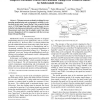Free Online Productivity Tools
i2Speak
i2Symbol
i2OCR
iTex2Img
iWeb2Print
iWeb2Shot
i2Type
iPdf2Split
iPdf2Merge
i2Bopomofo
i2Arabic
i2Style
i2Image
i2PDF
iLatex2Rtf
Sci2ools
88
Voted
ASPDAC
2010
ACM
2010
ACM
Adaptive performance control with embedded timing error predictive sensors for subthreshold circuits
Abstract-- This paper presents an adaptive technique for compensating manufacturing and environmental variability in subthreshold circuits using "canary flip-flop" that can predict timing errors. A 32-bit Kogge-Stone adder whose performance was controlled by body-biasing was fabricated in a 65 nm CMOS process. Measurement results show that the adaptive control can reduce the power dissipation by 46% in comparison with the worst-case design with guardbanding.
| Added | 10 Feb 2011 |
| Updated | 10 Feb 2011 |
| Type | Journal |
| Year | 2010 |
| Where | ASPDAC |
| Authors | Hiroshi Fuketa, Masanori Hashimoto, Yukio Mitsuyama, Takao Onoye |
Comments (0)

